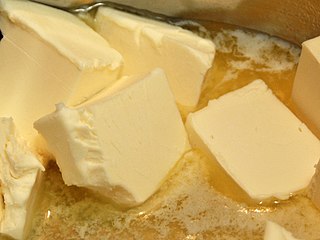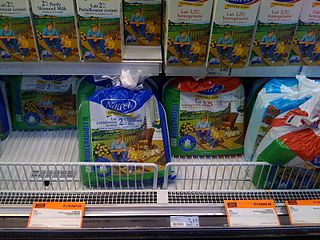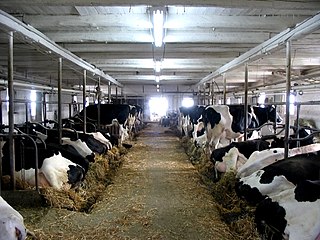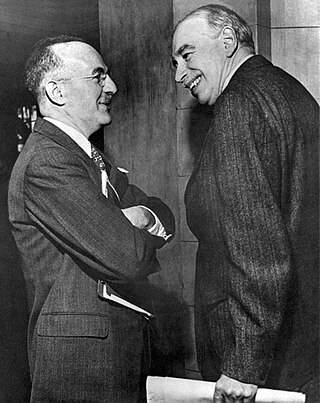Related Research Articles

Cream is a dairy product composed of the higher-fat layer skimmed from the top of milk before homogenization. In un-homogenized milk, the fat, which is less dense, eventually rises to the top. In the industrial production of cream, this process is accelerated by using centrifuges called "separators". In many countries, it is sold in several grades depending on the total butterfat content. It can be dried to a powder for shipment to distant markets, and contains high levels of saturated fat.
The General Agreement on Tariffs and Trade (GATT) is a legal agreement between many countries, whose overall purpose was to promote international trade by reducing or eliminating trade barriers such as tariffs or quotas. According to its preamble, its purpose was the "substantial reduction of tariffs and other trade barriers and the elimination of preferences, on a reciprocal and mutually advantageous basis."

Butter is a dairy product made from the fat and protein components of churned cream. It is a semi-solid emulsion at room temperature, consisting of approximately 80% butterfat. It is used at room temperature as a spread, melted as a condiment, and used as a fat in baking, sauce-making, pan frying, and other cooking procedures.

The Canadian Dairy Commission (CDC) is an Ottawa-based Government of Canada Crown Corporation that provides a framework for managing Canada's dairy industry.
Butterfat or milkfat is the fatty portion of milk. Milk and cream are often sold according to the amount of butterfat they contain.

The Secretariat of the Pacific Regional Environment Programme (SPREP) is an intergovernmental organisation based in Apia, Samoa with more than 90 staff members. The organisation is held accountable by the governments and administrations of the Pacific region to ensure the protection and sustainable development of the region's natural resources. The organisation actively promotes the understanding of the connection between Pacific island people and their natural environment and the impact that these have on their sustenance and livelihoods. The organisation was established in 1982. Previously South Pacific Regional Environment Programme, the word "South" was replaced with "Secretariat" in 2004, in recognition of the members north of the equator. The French equivalent name is Programme régional océanien de l’environnement (PROE).

Westland Milk Products is a dairy company based in Hokitika, New Zealand. It has been owned by Chinese dairy company Yili Group since 2019. It is the third largest dairy processor in New Zealand with a 3.4% market share.

The fat content of milk is the proportion of milk, by weight, made up by butterfat. The fat content, particularly of cow's milk, is modified to make a variety of products. The fat content of milk is usually stated on the container, and the color of the label or milk bottle top varied to enable quick recognition.
The International Sugar Agreements and similarly named agreements were a series of International treaties that attempted to establish an "orderly relationship between the supply and demand for sugar in the world market." They eventually established the International Sugar Organization.

Canada's supply management, abbreviated SM, is a national agricultural policy framework used across the country, which controls the supply of dairy, poultry and eggs through production and import controls and pricing mechanisms. The supply management system was authorized by the 1972 Farm Products Agencies Act, which established the two national agencies that oversee the system. The Agriculture and Agri-Food Canada federal department is responsible for both the Canadian Dairy Commission and its analogue for eggs, chicken and turkey products, the Farm Products Council of Canada. Five national supply management organizations, the SM-5 Organizations — Egg Farmers of Canada (EFC), Turkey Farmers of Canada (TFC), Chicken Farmers of Canada (CFC), the Canadian Hatching Egg Producers (CHEP) and the Ottawa-based Canadian Dairy Commission (CDC), a Crown corporation — in collaboration with provincial and national governing agencies, organizations and committees, administer the supply management system.

The World Trade Organization (WTO) is an intergovernmental organization which regulates international trade. The WTO officially commenced on 1 January 1995 under the Marrakesh Agreement, signed by 123 nations on 15 April 1994, replacing the General Agreement on Tariffs and Trade (GATT), which commenced in 1948. The WTO deals with regulation of trade between participating countries by providing a framework for negotiating trade agreements and a dispute resolution process aimed at enforcing participants' adherence to WTO agreements, which is signed by representatives of member governments and ratified by their parliaments. Most of the issues that the WTO focuses on derive from previous trade negotiations, especially from the Uruguay Round (1986–1994).
The following is a list of international bilateral treaties between Australia and Austria
The following is a list of international bilateral treaties between Australia and Belgium
The following is a list of international bilateral treaties between Australia and Chile
The following is a list of international bilateral treaties between Australia and the Czech Republic
The following is a list of international bilateral treaties between Australia and Finland
The following is a list of international bilateral treaties between Australia and Germany
References
- ↑ "WTO | legal texts - Marrakesh Agreement". www.wto.org. World Trade Organisation. Retrieved 17 June 2017.
- ↑ “Arrangement concerning certain Dairy Products . ATS 8 of 1970” [ permanent dead link ]. Australasian Legal Information Institute, Australian Treaties Library. Retrieved on 15 April 2017.
- ↑ "Protocol relating to Milk Fat. ATS 15 of 1973)” [ permanent dead link ]. Australasian Legal Information Institute, Australian Treaties Library. Retrieved on 15 April 2017.
 This article incorporates public domain material from Jasper Womach. Report for Congress: Agriculture: A Glossary of Terms, Programs, and Laws, 2005 Edition (PDF). Congressional Research Service.
This article incorporates public domain material from Jasper Womach. Report for Congress: Agriculture: A Glossary of Terms, Programs, and Laws, 2005 Edition (PDF). Congressional Research Service.